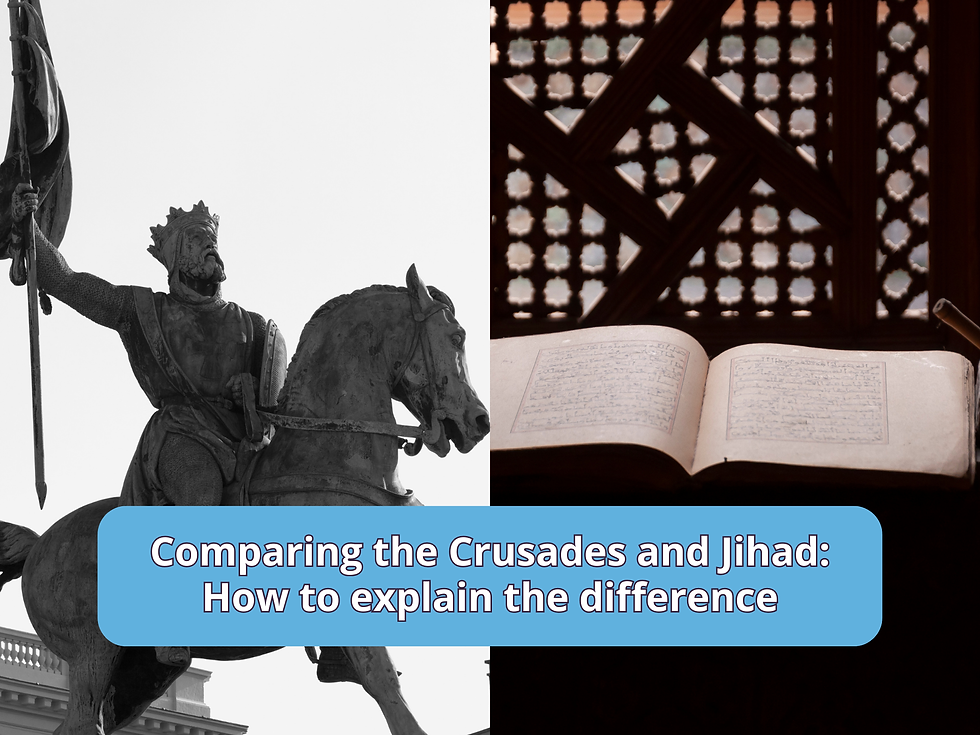Comparing the Crusades and Jihad: How to explain the difference
- Call of Love Ministries

- Sep 10, 2025
- 4 min read

The majority of this blog post is inspired by our free resource on the Crusades. Download and read this free guide here.
Possibly two of the most avoided conversation topics when it comes to Christian studies of Islam are jihad and how the Christian crusades relate to it. Many Muslims will use these two topics and tie them together, saying, “Well, Christians had the crusades, so they cannot judge anything the Quran says about jihad,” and attach a disclaimer at the end, “jihad is not always about violence anyway.”
How are Christians to know the truth if there are no studies into the following topics?
Are the Crusades truly comparable to Islamic jihad?
If not, what is the difference?
Are we supposed to defend the actions of the church in the Crusades, or were they a dark time in church history?
Definitions to know about the Crusades and jihad
The Crusades were militant expeditions into the Middle East done by Christians in the 11th, 12th, and 13th centuries. The goal was to reclaim the Holy Land in Jerusalem, which was under Muslim rule.
Jihad is a belief in the Quran that is defined as “holy war.” Some modern-day, more nominal Muslims claim that this is not supposed to include violence and forced conversions of infidels (non-Muslims). However, when we look at the context of Islam’s conception and how its leader, Muhammad, practiced jihad, we realize that this is the true meaning of jihad.
Are the Crusades similar to jihad? Historical study and context of the crusades
It was Pope Urban II who said:“I say it to those who are present. I command that it be said to those who are absent. Christ commands it. All who go thither and lose their lives, be it on the road or on the sea, or in the fight against the pagans, will be granted immediate forgiveness for their sins. This I grant to all who will march by virtue of the great gift which God has given me.” Urban II 1 Justo L. Gonzalez, The Story of Christianity Volume I. Harper and Row, New York 1984. pg. 292.
Pope Urban II was responding to attacks on pilgrims who had been journeying to the Holy Land by Muslims in Turkey. This proclamation inflamed European Christians into organizing the first crusade to reclaim the Holy Land, and these wars lasted from AD 1096 to AD 1291.
During that time, Christianity was in a dark place. Christians had no Bibles in their homes and had to trust and follow the teachings of the clergy in the Church.
Furthermore, the Christian church, under attack since the 7th century by the Muslims, became enthused with the Muslim concept of holy war. With no Bibles to educate and enlighten the Christians, they strayed away from Christ’s teachings and allowed their beliefs to be reshaped by the conquering powers of Islam and the myths and cults of that age.
European Crusaders could be seen as lawful in reclaiming the lands that Islam had captured by force. After all, nations and people groups wage wars to protect themselves or reclaim what the enemy has captured. But those crusaders wandered off from the origins of their faith when they slashed and burned and forced conversions, doing this in the name of Christianity. Making this a religious war, carrying the crosses, and marching in the name of the God of the Bible was the mistake here. Jesus never used violence; neither did He call His disciples to use it. The New Testament never endorsed violence to force conversions or to spread the Word of the true God.
Are the Crusades different from the Islamic jihad?
What many people fail to acknowledge when attacking Christianity for the Crusades, which were antithetical to Jesus’ teachings, is that Muslims had waged their own form of crusades from the seventh to the eleventh century.
Muslim conquerors took over the Holy Land from the Romans in AD 638. They then expanded their power and territory, killing throughout the Middle East and parts of Europe and forcing conversions.
The difference is that these Islamic crusades were not in opposition to the Quran’s teachings; in fact, they were the result of living out Islam to the utmost degree. It is a plain and unpleasant historical fact that in the ten years that Muhammad lived in Medina (AD 622-632), he either sent out or went out on seventy-four raids, expeditions, or full-scale wars, which ranged from small assassination hit squads to mass murdering of entire Jewish or Christian tribes who would not submit to him and Islam.
Muslim extremists follow the footsteps of their prophet, still wage holy wars, or jihad, to this day, to spread Islam by force.
You can read more about jihad and sharia law in this post: The Uncomfortable Conversation: Talking with your Muslim friends about Jihad and Sharia Law
And you can see a detailed outline of all Islamic crusades in the free resource: https://www.calloflove.org/the-crusades
Should I talk about the Crusades or Jihad with Muslims?
This is not a topic to actively open conversations about. If a Muslim tries to point out that the Crusades are proof that Christians are violent, you can explain to them that the Crusades are not in line with how Jesus commands His followers to live. Then, you can ask them what their view is on jihad and spreading Islam by force.
Please note, the extremist and purist Muslims are less than ten percent of all Muslims. This does not change the fact of the teachings of Islam, but it does mean your Muslim friend is most likely against religious violence.





